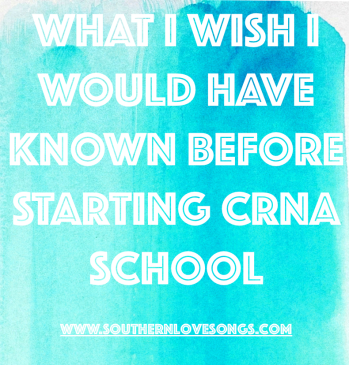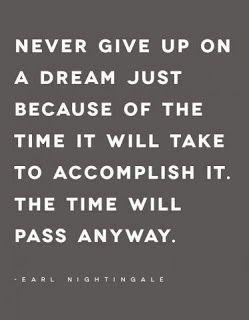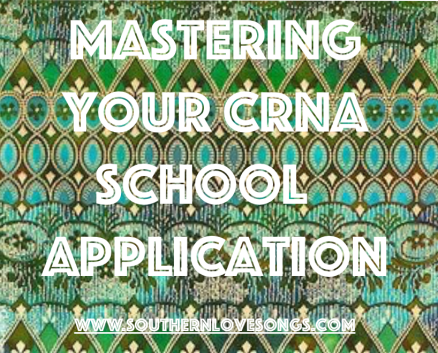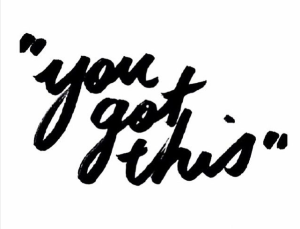Hey everyone! I hope you are enjoying my anesthesia school posts! If you would like to read more about my time in school, visit my new and improved website http://www.brittanybharvey.com
All blog posts will be made on my new website as of December 2018. Thank you for your continued support!

Before I start with the, “I wish I would have known…”mumbo jumbo, let me clarify… Although I do wish I would have known certain details before starting my CRNA journey, I have NEVER once regretted my decision of going off to CRNA school. In fact, it’s the best decision I’ve ever made for myself. And honestly, one of the biggest lessons I have learned throughout my last 27 years is being financially independent is truly INVALUABLE.

Prior to starting CRNA school, I believed my only stressor would be the academic workload and rotations. After my first month in the program, I quickly realized I was mistaken.
Now, many of you reading this know I qualified for ACM (Academic Common Market) due to Georgia not having a DNP CRNA program last year. As glorious as it sounds, I unfortunately had many issues while applying for financial aid because of my ACM status. Granted, it could have just been the lack of organization and communication between UTHSC’s departments, but when I tell you I was in the financial aid office twice a week for two months straight, I’m not exaggerating. It was exhausting and unbelievably dispiriting, especially since the novelty and excitement of school had just kicked in.
Before accepting my offer to UTHSC, I had spoken with ACM and UTHSC’s financial aid office. Both of them confirmed I would be able to take out the maximum student loans for an out-of-state student. Pretty much an extra $15-20,000 a year. Well once I moved to Memphis and began the process of accepting my student loans, UTHSC completely rescinded what they had originally told me. Basically, I could only take out the maximum for an in-state-student, which is a joke. So like most poor graduate students, I had to max out my graduate-plus loans as well, which is also a joke because it still wasn’t enough money to cover my basic expenses. I can’t tell you the number of times I left the financial aid office crying because I thought I wasn’t going to be able to afford CRNA school anymore.
Let me explain why… My first year refund with all government loans maxed is roughly $16,000 for the ENTIRE year. Now to be fair, the $16,000 refund is after EVERYTHING has been taken out, including health insurance. However, to live off such a small amount of money for an entire year is blatantly unrealistic. Not to mention, there are several unanticipated expenses that will undoubtably sprout up during school, including the initial Typhon, APEX, AANA, TANA, and NBCRNA fees, which were around $500 alone… and that was just in the first week of school!!
You see, CRNA programs are umbrella’d into the School of Nursing and student loan disbursements are based off the average salary for the School of Nursing graduates. Therefore, the problem obviously lies in the fact that a CRNA’s average salary is very different than a nurse or NP’s average salary. Also, most nursing students (BSN, MSN, DNP-NP) can still work while completing their programs and their tuition is usually much less than ours. I know I personally worked during my BSN program and since I was under 26, my parents were able to claim me on their health insurance. Additionally, so many NP programs are online now, including the NP programs here at UTHSC. So unfortunately our CRNA program gets financially lumped in with theirs and respectfully, you really can’t compare the two as far as academic workload or finances are concerned. Now, I do understand the quality of CRNA/NP programs vary greatly (online vs on campus) and I am speaking in a more generalized sense. By no means am I trying to offend anyone; the world needs both professions and they are equally respected.
Luckily, I have an amazing support system back home and my parents/grandparents stepped right up to help. However, not everyone is as fortunate and that’s where the upset comes in. At the end of the day, I would highly encourage prospective nurses to thoroughly research and talk with current SRNAs about their financial aid and general finances. Believe me, no SRNA will be shy when it comes to expressing their finances, as this seems to be a universal obstacle for us.
With all I’ve said about my finances, don’t get discouraged! My point is to be brutally honest with how financially stressful CRNA school can be so you aren’t shocked and unprepared like I was.
As cheesy as it sounds, if there’s a will, there’s a way. I know several second and third year SRNAs who took out private loans on top of maxing out government loans. I know it sounds scary, but at the end of the day you will be in the best position possible and you won’t have to ever worry about money again. Therefore, taking out a reasonable amount of student loans should NEVER be a deciding factor for attending CRNA school.
Another factor I wish I would have known before starting CRNA school? The ability to take certain online DNP courses ahead of time, including: Theory & Philosophy, Biostatistics, Epidemiology, Health Assessment, and Leadership & Health Policy. I’ve mentioned this in a previous post but I feel the need to repeat myself because I really wish I would have done this! However, before jumping the gun, make sure these classes are the required level and your prospective school will except the transfers. For example, undergraduate statistics is not the same and your BSN Health Assessment isn’t a graduate level course.
On a side note, congratulations to all those who interviewed and were accepted to UTHSC next year!! I’m also going to also create a post about what I’ve learned since starting school, so stay posted!! As always, if you ever have any questions don’t hesitate to ask!









